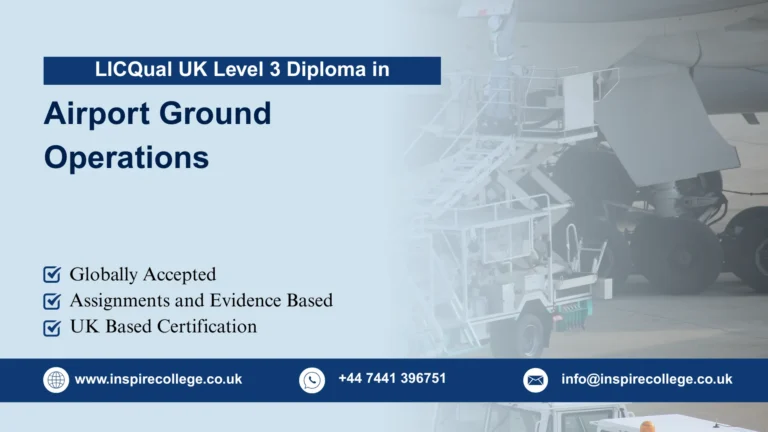
ICTQual AB Level 6 International Diploma in Marine & Naval Engineering
The ICTQual AB Level 6 International Diploma in Marine & Naval Engineering is a premier qualification designed to equip learners with advanced expertise in ship design, naval architecture, marine propulsion systems, and maritime operations. In an era where global trade, naval defense, and marine technologies are rapidly evolving, professionals with specialized knowledge in marine and naval engineering are increasingly in demand. This internationally recognized diploma provides a comprehensive pathway for both fresh graduates and experienced professionals to develop industry-ready skills and strategic insight into the maritime sector.
This three-year program, comprising 360 credits, offers a structured curriculum that bridges foundational principles with advanced engineering applications. Learners will gain an in-depth understanding of naval architecture, shipbuilding techniques, marine propulsion, fluid mechanics, maritime safety standards, and modern marine technologies. The course emphasizes practical applications, including hands-on ship design projects, simulation of propulsion systems, marine material analysis, and navigation system operations, ensuring learners can translate theoretical knowledge into real-world solutions.
Graduates of this program will develop critical problem-solving, analytical, and project management skills essential for careers in ship design, maritime operations, naval defense, offshore engineering, and marine research. Additionally, the program cultivates an understanding of sustainable marine technologies and compliance with international maritime regulations, enabling learners to contribute responsibly to the industry.
By enrolling in this course through our approved ICTQual AB centre, learners benefit from expert guidance, structured assessments, and access to a globally recognized qualification. Upon completion, graduates are well-prepared to advance their careers in the competitive marine and naval engineering sector or pursue further specialized research and professional development internationally.
To enrol in the ICTQual AB Level 6 International Diploma in Marine & Naval Engineering, learners must meet specific entry criteria designed to ensure readiness for advanced study in marine and naval engineering. These requirements are suitable for both fresh graduates and experienced professionals seeking to advance their careers in the maritime sector
1. Age Requirements
- Learners must be 18 years or older at the time of enrolment
- Candidates under 18 may be considered on a case-by-case basis, provided they meet other educational and professional prerequisites
2. Educational Requirements
- Minimum high school or secondary school completion with strong foundations in mathematics and science
- For candidates without formal qualifications, relevant vocational training or technical certifications in marine or engineering fields may be considered
- Related courses include the ICTQual AB Level 5 Diploma in Marine Engineering or ICTQual AB Level 5 Diploma in Naval Architecture, which can serve as a foundation for progression
3. Professional Experience
- Professionals with minimum 3–6 years of verifiable experience in marine, naval, offshore, or maritime engineering roles may apply through a fast-track experience-based route
- Experience must be documented with work portfolios, project records, and employer references to validate eligibility
- Fresh candidates without prior experience are required to complete the full 3-year, 360-credit program including all assignments
4. English Language Proficiency
- Learners whose first language is not English must demonstrate proficiency in English, equivalent to IELTS 5.5–6.0 or TOEFL iBT 60–70
- Proficiency in reading, writing, listening, and speaking is required to successfully complete assignments, assessments, and project work
Meeting these entry requirements ensures learners are fully prepared to engage with advanced topics in marine and naval engineering, from ship design and propulsion systems to maritime safety and naval operations. Enrolling through our approved ICTQual AB centre provides expert guidance, structured assessments, and access to a globally recognized Level 6 qualification, equipping graduates for professional success in the international marine and naval engineering sector
Mandatory Units
This qualification, the ICTQual AB Level 6 International Diploma in Marine & Naval Engineering 360 Credits – Three Years, consists of 36 mandatory units.
Year 1 – Foundation in Marine & Naval Engineering
- Principles of Marine and Naval Engineering
- Engineering Mathematics
- Fundamentals of Mechanical and Electrical Engineering
- Materials Science and Engineering
- Engineering Drawing and Computer-Aided Design (CAD)
- Introduction to Fluid Mechanics and Hydrodynamics
- Basics of Marine Propulsion Systems
- Naval Architecture – Fundamentals
- Marine Structures and Ship Construction
- Health, Safety, and Environmental Practices in Maritime Engineering
- Communication and Technical Report Writing
- Introduction to Project Management in Engineering
Year 2 – Intermediate Studies in Marine & Naval Engineering
- Marine Hydrodynamics and Stability
- Marine Propulsion and Power Systems
- Structural Analysis and Ship Design
- Offshore and Coastal Engineering – Fundamentals
- Marine Electrical and Control Systems
- Materials and Corrosion in Marine Environments
- Marine Maintenance and Reliability Engineering
- Computational Methods in Naval Architecture
- Sustainable Maritime Engineering and Green Technologies
- Applied Research Methods in Marine Engineering
- Port and Harbour Engineering – Basics
- Project Planning and Marine Operations Management
Year 3 – Advanced Studies in Marine & Naval Engineering
- Advanced Ship Design and Modelling
- Advanced Propulsion and Power Plant Systems
- Offshore Structures and Subsea Engineering
- Advanced Hydrodynamics and Computational Fluid Dynamics (CFD)
- Naval Defence Systems and Military Applications
- Smart Marine Technologies and Industry 4.0
- Robotics and Autonomous Systems in Maritime Engineering
- Cyber-Physical Systems and IoT in Marine Engineering
- Professional Ethics and Sustainability in Marine & Naval Engineering
- Innovation and Entrepreneurship in Marine Technology
- Infrastructure and Facility Planning for Maritime Systems
- Final Year Major Project (Capstone Project)
This internationally recognized diploma equips learners with comprehensive expertise in marine and naval engineering. Graduates gain hands-on experience, advanced technical skills, and practical knowledge in ship design, propulsion, hydrodynamics, offshore systems, maritime safety, and sustainable marine technologies. The program prepares learners for professional roles in shipbuilding, naval architecture, offshore engineering, maritime operations, and research.
Year 1 – Foundation in Marine & Naval Engineering
1. Principles of Marine and Naval Engineering
- Understand fundamental concepts of marine engineering, naval operations, and ship systems
- Apply engineering principles to basic maritime design and operational scenarios
- Recognize the roles and responsibilities of marine engineers in commercial, defense, and offshore sectors
2. Engineering Mathematics
- Solve engineering problems using calculus, linear algebra, and statistical methods
- Apply mathematical modeling to analyze fluid flow, ship stability, and structural integrity
- Develop quantitative reasoning for engineering design and performance assessment
3. Fundamentals of Mechanical and Electrical Engineering
- Demonstrate core mechanical and electrical engineering principles in marine contexts
- Analyze basic shipboard machinery and electrical systems for functionality and safety
- Conduct laboratory experiments to validate theoretical engineering concepts
4. Materials Science and Engineering
- Identify and evaluate marine-grade materials for ship structures and machinery
- Analyze material properties for strength, corrosion resistance, and durability
- Apply practical testing techniques to select materials for maritime applications
5. Engineering Drawing and Computer-Aided Design (CAD)
- Produce accurate technical drawings and 3D CAD models for marine components
- Interpret schematics to support ship design, maintenance, and construction
- Simulate ship systems and assemblies using CAD tools
6. Introduction to Fluid Mechanics and Hydrodynamics
- Explain principles of fluid mechanics and their application to ship design
- Analyze water flow around hulls, propellers, and offshore structures
- Conduct experiments and simulations to study hydrodynamic behavior
7. Basics of Marine Propulsion Systems
- Understand the operation of marine engines, propellers, and auxiliary systems
- Evaluate propulsion efficiency and performance metrics
- Apply practical techniques to monitor and optimize marine propulsion systems
8. Naval Architecture – Fundamentals
- Describe ship design principles, stability, and hull forms
- Analyze ship loading conditions and stability factors
- Apply naval architecture tools to basic ship design tasks
9. Marine Structures and Ship Construction
- Identify ship structural components and their functions
- Apply structural analysis techniques to ensure safety and durability
- Understand basic shipbuilding processes and quality control methods
10. Health, Safety, and Environmental Practices in Maritime Engineering
- Implement maritime safety standards and environmental regulations
- Conduct risk assessments for marine operations and shipboard tasks
- Promote sustainable practices in ship design and marine operations
11. Communication and Technical Report Writing
- Prepare professional technical reports and documentation for marine projects
- Communicate complex engineering concepts clearly to technical and non-technical audiences
- Apply standard maritime reporting formats in written and oral communication
12. Introduction to Project Management in Engineering
- Understand engineering project lifecycles and management principles
- Develop project schedules, budgets, and resource plans for marine projects
- Apply project management tools to plan small-scale maritime engineering projects
Year 2 – Intermediate Studies in Marine & Naval Engineering
1. Marine Hydrodynamics and Stability
- Analyze ship stability, buoyancy, and hydrostatic forces
- Model hydrodynamic performance under operational conditions
- Apply computational methods to predict ship motion and seakeeping
2. Marine Propulsion and Power Systems
- Evaluate advanced propulsion systems, including diesel engines, gas turbines, and hybrid systems
- Analyze energy efficiency, fuel consumption, and emissions control
- Conduct simulations and practical exercises on marine power plants
3. Structural Analysis and Ship Design
- Perform stress and strain analysis on ship hulls and structures
- Design ship components for safety, durability, and performance
- Apply finite element methods to simulate structural behavior
4. Offshore and Coastal Engineering – Fundamentals
- Understand offshore platform design, coastal protection, and marine infrastructure
- Analyze environmental and operational factors affecting offshore structures
- Apply practical solutions for offshore engineering challenges
5. Marine Electrical and Control Systems
- Integrate shipboard electrical and control systems for operation and safety
- Analyze electrical network performance and troubleshoot issues
- Use software tools for simulation of control systems on vessels
6. Materials and Corrosion in Marine Environments
- Evaluate the effects of marine environments on materials and structures
- Apply corrosion prevention and maintenance strategies
- Conduct laboratory and field experiments on marine materials
7. Marine Maintenance and Reliability Engineering
- Develop maintenance schedules for shipboard machinery and systems
- Apply reliability engineering methods to predict component lifespan
- Conduct inspections and implement preventive maintenance practices
8. Computational Methods in Naval Architecture
- Utilize simulation and modeling software for ship design and stability analysis
- Apply computational fluid dynamics (CFD) for hull and propeller optimization
- Analyze numerical results to inform engineering decisions
9. Sustainable Maritime Engineering and Green Technologies
- Evaluate sustainable technologies for fuel efficiency and emissions reduction
- Propose innovative solutions for eco-friendly marine operations
- Implement green practices in ship design and maritime projects
10. Applied Research Methods in Marine Engineering
- Conduct research to solve marine engineering problems
- Apply data collection, statistical analysis, and validation techniques
- Present research findings in structured technical reports
11. Port and Harbour Engineering – Basics
- Understand port design, harbor operations, and logistics management
- Apply civil and structural engineering principles to maritime infrastructure
- Analyze operational efficiency and safety of port systems
12. Project Planning and Marine Operations Management
- Develop comprehensive plans for maritime projects
- Manage resources, budgets, and timelines effectively
- Apply operational management techniques for ships and port operations
Year 3 – Advanced Studies in Marine & Naval Engineering
1. Advanced Ship Design and Modelling
- Design complex ships using advanced modeling and simulation tools
- Optimize hull forms for performance and fuel efficiency
- Conduct practical ship design projects applying industry standards
2. Advanced Propulsion and Power Plant Systems
- Analyze and optimize marine propulsion for high-performance vessels
- Evaluate power generation, distribution, and energy efficiency systems
- Conduct advanced simulations for marine power plant operations
3. Offshore Structures and Subsea Engineering
- Design and analyze offshore platforms, subsea pipelines, and underwater systems
- Apply structural and environmental analysis for offshore safety
- Implement best practices for offshore construction and maintenance
4. Advanced Hydrodynamics and Computational Fluid Dynamics (CFD)
- Apply CFD to complex ship and offshore structure simulations
- Analyze turbulent flows, wave interaction, and seakeeping performance
- Use computational tools to optimize hull and propeller designs
5. Naval Defence Systems and Military Applications
- Understand principles of naval defense, weapons systems, and maritime security
- Analyze military vessel design, operational strategies, and technology integration
- Apply practical skills for defense-related maritime engineering projects
6. Smart Marine Technologies and Industry 4.0
- Implement IoT, automation, and AI technologies in maritime operations
- Use digital twins and predictive maintenance for ships and ports
- Optimize operational efficiency through smart marine solutions
7. Robotics and Autonomous Systems in Maritime Engineering
- Design and operate autonomous marine vehicles and robotic systems
- Apply control algorithms for navigation, inspection, and maintenance
- Conduct simulations and real-world trials of autonomous systems
8. Cyber-Physical Systems and IoT in Marine Engineering
- Integrate cyber-physical systems for ship monitoring and operations
- Analyze data from IoT-enabled marine devices for predictive maintenance
- Implement secure and resilient networked maritime systems
9. Professional Ethics and Sustainability in Marine & Naval Engineering
- Apply ethical principles to engineering decision-making
- Promote sustainability in ship design, offshore projects, and marine operations
- Evaluate the environmental and societal impact of engineering solutions
10. Innovation and Entrepreneurship in Marine Technology
- Develop business plans and innovative solutions for maritime ventures
- Identify market opportunities and financial feasibility in marine technology
- Apply entrepreneurship strategies to advance careers in marine engineering
11. Infrastructure and Facility Planning for Maritime Systems
- Plan ports, shipyards, and maritime infrastructure with operational efficiency
- Conduct feasibility studies and risk assessments for facility development
- Apply engineering and management principles for large-scale marine projects
12. Final Year Major Project (Capstone Project)
- Plan, design, and execute a comprehensive marine engineering project
- Apply interdisciplinary knowledge and technical skills to solve real-world challenges
- Present findings, designs, and recommendations in a professional, industry-standard format
Upon completing the ICTQual AB Level 6 International Diploma in Marine & Naval Engineering, learners will possess advanced technical knowledge, practical skills, and industry-ready expertise in ship design, naval architecture, propulsion systems, offshore engineering, and sustainable marine technologies. Graduates are equipped for professional roles, research opportunities, and leadership positions in the global marine and naval engineering sector.
This program is designed for learners who aspire to build advanced technical knowledge and practical skills in marine and naval engineering. It is suitable for fresh graduates aiming to enter the maritime sector as well as experienced professionals seeking career advancement or specialization.
1. Academic Background and Interests
- Recent school or college graduates with strong foundations in mathematics, physics, or engineering-related subjects
- Individuals passionate about marine engineering, ship design, naval architecture, and offshore systems
- Learners interested in hydrodynamics, propulsion systems, maritime safety, and sustainable marine technologies
2. Professional Aspirations
- Professionals aiming to advance their careers in marine engineering, naval architecture, offshore engineering, or maritime operations
- Candidates seeking roles in ship design, port and harbor engineering, propulsion systems, naval defense, or autonomous marine technologies
- Learners targeting positions in project management, research, or leadership roles within the maritime industry
3. Skills and Competencies
- Desire to develop technical, analytical, and problem-solving skills for marine and naval applications
- Interest in using modern engineering tools, CAD software, simulation, and computational methods for ship and offshore structure design
- Commitment to learning industry safety standards, regulatory compliance, and sustainable marine practices
4. Personal Attributes
- Strong motivation to innovate and apply advanced engineering concepts in practical maritime projects
- Ability to work independently and collaboratively on complex marine engineering assignments
- Willingness to embrace professional ethics, continuous learning, and international standards in marine and naval engineering
This course is ideal for learners who are motivated to combine technical expertise, practical skills, and innovation to excel in global marine and naval engineering careers. Graduates will be fully prepared for professional roles, research opportunities, and leadership positions in the international maritime industry.
As an approved centre of ICTQual AB, learners must enrol with us to pursue this internationally recognized qualification. The certification route varies based on prior experience
1. Route for Experienced Professionals (Minimum 6 Years Verifiable Experience)
- Professionals with at least six years of verifiable work experience in marine, naval, offshore, or maritime engineering roles may qualify for an experience-based route
- Candidates are required to submit documented evidence of their professional experience, including references, project records, and work portfolios
- Upon verification, learners may be exempted from completing all 36 assignments, focusing instead on applying their practical expertise and completing any required assessments or project submissions
- This route enables experienced professionals to fast-track their certification while validating their existing skills and industry experience
2. Route for Fresh Candidates (No Prior Experience)
- Fresh graduates or individuals new to marine and naval engineering must complete the full 3-year program, including all 36 assignments across the curriculum
- Learners will gain foundational, intermediate, and advanced skills through structured learning, practical exercises, and assessments
- Successful completion of all assignments, projects, and evaluations ensures that learners meet the standards required by ICTQual AB for Level 6 certification
- This route provides a comprehensive learning experience, preparing candidates for professional careers in ship design, naval architecture, offshore systems, and maritime operations
Enrolment
- Learners must enrol with our approved ICTQual AB centre to access course materials, assignments, assessments, and expert guidance throughout the program
- Our centre provides mentorship, support, and verification assistance to ensure all learners, whether experienced professionals or fresh candidates, successfully achieve their internationally recognized Level 6 qualification
Register Now
FAQs for ICTQual AB Level 6 International Diploma in Marine & Naval Engineering






